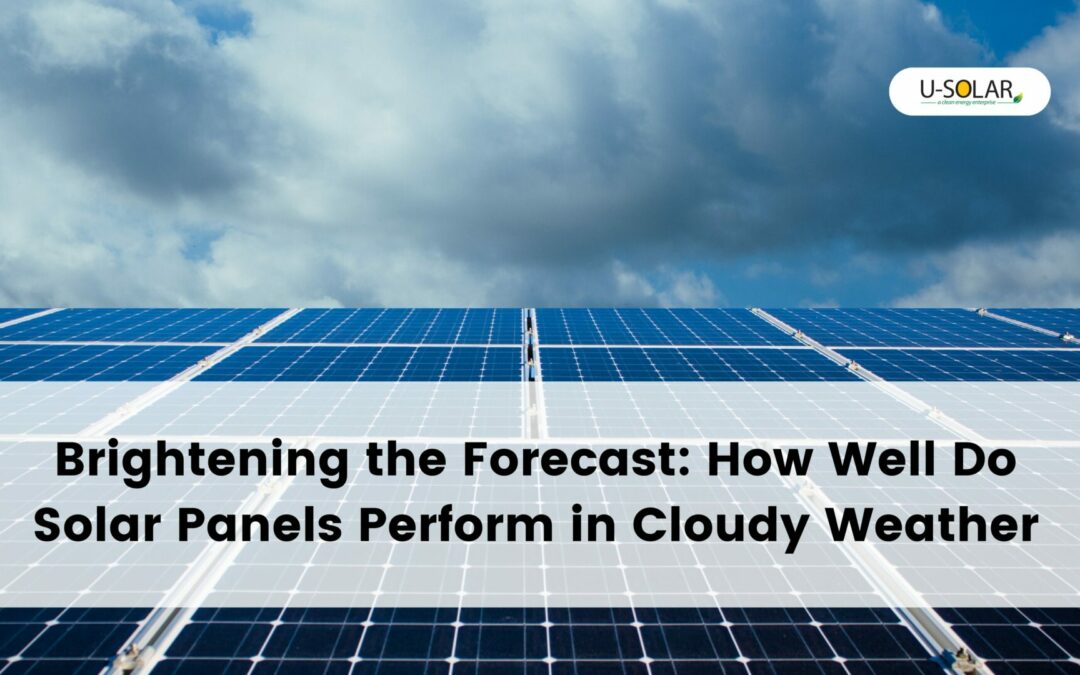In recent years, solar energy has emerged as a promising alternative to traditional energy sources, offering sustainable and eco-friendly power solutions. However, a common concern among potential adopters is the performance of solar panels in cloudy weather. In this comprehensive guide, we delve into the efficiency of solar panels.
10 surprising facts about the efficiency of solar panels when the clouds roll in
1. Diffuse Light Utilization: While direct sunlight provides the most energy, solar panels can still generate electricity from diffuse light. Cloud cover scatters sunlight, creating a diffuse glow that reaches solar panels. Modern panels are adept at capturing this dispersed light, converting it into usable energy.
2. Bifacial Panels: These innovative solar panels are designed to capture light from both sides, maximizing energy production. Even on cloudy days, bifacial panels can benefit from reflected light off the clouds, enhancing their efficiency compared to traditional panels.
3. Amorphous Silicon Technology: Unlike traditional crystalline silicon panels, amorphous silicon panels excel in low-light conditions. Their flexibility and efficiency make them ideal for overcast days, ensuring continuous energy production regardless of weather fluctuations.
4. Ultraviolet (UV) Penetration: Clouds may obscure visible light, but they allow UV radiation to pass through. Solar panels are capable of converting UV rays into electricity, contributing to their overall efficiency even when skies are overcast.
5. Cloud Enhancement Effect: Surprisingly, certain types of clouds can enhance solar panel efficiency. Thin clouds can act as diffusers, spreading sunlight evenly across panels and reducing the risk of overheating, thus optimizing energy production.
6. Tilt Angle Optimization: Adjusting the tilt angle of solar panels can optimize energy generation during cloudy weather. By tilting panels slightly upwards, they can capture more sunlight, mitigating the impact of cloud cover and maintaining consistent energy output.
7. Battery Storage Integration: Pairing solar panels with battery storage systems allows surplus energy generated during sunny periods to be stored for later use. This reservoir of stored energy ensures a reliable power supply during extended periods of cloudiness or inclement weather.
8. Predictive Analytics: Advanced weather forecasting technologies enable solar operators to anticipate cloud cover and adjust energy production accordingly. By leveraging predictive analytics, solar farms can optimize energy generation by temporarily scaling up alternative energy sources or adjusting power distribution.
9. Hybrid Systems: Combining solar panels with other renewable energy sources such as wind or hydroelectric power creates hybrid systems with enhanced reliability. During cloudy weather, these systems can rely on alternative sources to supplement solar energy production, ensuring a consistent power supply.
10. Technological Advancements: Ongoing research and development in solar technology continue to improve panel efficiency, even in challenging weather conditions. From novel materials to enhanced designs, these advancements hold the promise of further boosting solar panel performance under cloudy skies.
In conclusion, the efficiency of solar panels in cloudy weather is a testament to their adaptability and resilience. Through innovative technologies, strategic planning, and a deeper understanding of atmospheric dynamics, solar power continues to emerge as a reliable and sustainable energy solution, regardless of weather conditions. As we harness the untapped potential of solar energy, we illuminate a brighter, more sustainable future for generations to come.
Frequently Asked Questions (FAQs)
1. Are solar panels effective when it’s cloudy?
Yes, solar panels can still generate electricity even on cloudy days. While direct sunlight yields the highest energy output, solar panels can also harness diffuse sunlight and UV radiation that penetrates through the clouds.
2. How much energy do solar panels produce on cloudy days compared to sunny days?
The energy output of solar panels varies depending on factors like cloud cover, panel orientation, and geographical location. Generally, solar panels can still produce a significant amount of energy on cloudy days, but the output may be lower compared to sunny days
3. Do certain types of clouds affect solar panel efficiency?
Yes, thin clouds can act as diffusers, spreading sunlight more evenly across solar panels and potentially enhancing efficiency. However, thick and dark clouds can significantly reduce the amount of sunlight reaching the panels, leading to decreased energy production.
4. What are bifacial solar panels, and how do they perform in cloudy weather?
Bifacial solar panels are designed to capture sunlight from both the front and rear sides. These panels can benefit from reflected light off clouds, potentially improving efficiency compared to traditional single-sided panels, especially in diffuse lighting conditions.
5. Can I rely on solar power during prolonged periods of cloudy weather?
While solar power can still contribute to energy generation during cloudy periods, it’s advisable to have alternative energy sources or backup systems in place, especially for critical energy needs. Pairing solar panels with battery storage systems or integrating them into hybrid renewable energy setups can help ensure a more reliable power supply.
6. How can I optimize solar panel efficiency in cloudy weather?
Optimizing the tilt angle of solar panels, using advanced predictive analytics for energy management, and investing in technologies like amorphous silicon panels or hybrid systems are some strategies to enhance solar panel efficiency in cloudy weather.
7. Do solar panels require maintenance during cloudy weather?
Solar panels generally require minimal maintenance regardless of weather conditions. However, it’s essential to ensure panels are kept clean and free from debris to maximize energy absorption, especially during periods of reduced sunlight.
Need Professional Consultations?
At U-Solar, we offer expert consultations and services designed to keep your solar panels in prime condition and functioning at their best. Our team of certified professionals specializes in a comprehensive suite of maintenance services, from intricate electrical and structural inspections. We understand that each solar installation is unique, and we tailor our approach to meet the specific needs and challenges of your system. We ensure that your solar power system remains efficient, reliable, and capable of delivering maximum energy output.
Contact us today to learn how we can help you achieve optimal solar power performance through professional maintenance solutions.

